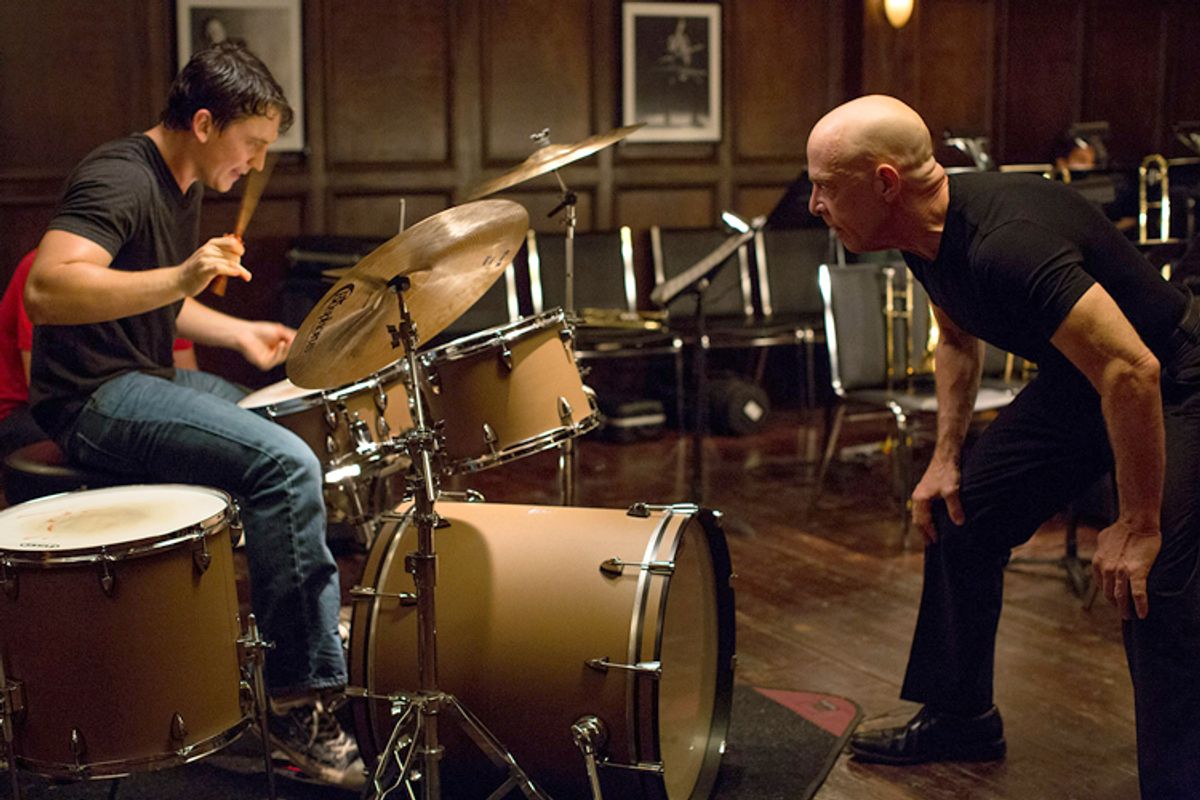PARK CITY, Utah — Provocative and emotionally intense, with surprising relevance for contemporary debates about education, coaching and nurturing excellence, writer-director Damien Chazelle’s “Whiplash” has been the breakout hit of this year’s Sundance Film Festival. Now that I’ve seen it, I know why. Chazelle, who’s only 29, has made one previous feature, a highly enjoyable and defiantly whimsical jazz musical called “Guy and Madeline on a Park Bench” that barely made it off the festival circuit in 2009. “Whiplash” is also a movie about jazz, at least on the surface, but that’s where the similarity ends. This is a muscular and accomplished work of kinetic cinema built around two tremendous acting performances, and it’s really about teaching and obsession and the complicated question of how to nurture excellence and where the nebulous boundary lies between mentorship and abuse.
Chazelle clearly understands the intensely competitive world of music schools in general and jazz education in particular, but “Whiplash” is about jazz in almost exactly the same way that “Black Swan” is about ballet. Miles Teller (of “21 & Over” and “The Spectacular Now”) really does play the drums, and that’s where his character, a socially awkward 19-year-old conservatory student named Andrew, is most at home. (I’m pretty sure a professional drummer is used for the most difficult passages, but Teller’s pretty good.) The musical performances in the film are intensely compelling, and drive the drama forward to a large extent, just as the big game drives a football movie or opening night drives a backstage musical. Chazelle also captures the fact that music is always a physical endeavor, a fact exaggerated by the demands of the drum kit; Andrew literally sheds blood, sweat and tears in his pursuit of greatness.
Versions of this story could be told (and have been told) in the worlds of sports, theater, the fine arts, science and engineering, and numerous other demanding disciplines. Indeed “Whiplash” is in some respects a military film, a boot-camp film, with J.K. Simmons’ suave and profane Terence Fletcher as the drill sergeant. Fletcher leads the top-ranked jazz ensemble at New York’s top-ranked music school, and he rapidly seizes on Andrew, both for his obvious talent and his obvious vulnerability. From the first moment it’s clear that there’s something sadistic in Fletcher, an urge to dominate, to break down his students’ personalities and remake them in his own image. But the question Chazelle wants to ask us is not an easy one to answer: Is some of that domination and deconstruction necessary if we want to train great drummers, great dancers, great doctors and great engineers?
Teller gives a raw, fearless, almost naked performance as Andrew, but I’m launching the 2015 Oscar campaign for J.K. Simmons right now. A bald, wiry, growly fellow recognizable to generations of movie and TV viewers for his roles in HBO’s “Oz,” the cop series “The Closer,” Sam Raimi’s “Spider-Man” trilogy and many others, Simmons has always been a potent and precise screen presence. But Fletcher is the masterpiece of his career to date, a magnetic, commanding and duplicitous figure whose every gesture is controlled and considered and whose inner world remains under wraps. His teaching style rests largely on vicious and offensive homophobic mockery: “That’s not your boyfriend’s dick; don’t come too early,” he tells a sax player. But the young men (and a smattering of women) in his ensemble clearly respect him and respond to him. The impossible challenge faced by Andrew, a raw and unformed kid who still goes to the movies with his dad (a nice supporting turn for Paul Reiser), is to figure out how far this guy can take him, and whether to submit to tyranny, resist or walk away.
Fletcher will start the band and stop them seconds later — after four bars, or even two — to hunt down an out-of-tune trombonist, or swap out a front-line player for an alternate. He pits Andrew against two other drummers, including the older incumbent, in a harrowing, hours-long showdown aimed at compelling one of them to play a fantastically difficult beat (on an up-tempo composition called “Whiplash”) exactly the way he wants it. But as his sadomasochistic relationship with Andrew develops into malice, brutality and even literal violence, our understanding of Fletcher becomes more complicated. Late in the film, Andrew sees Fletcher playing jazz piano in a nightclub — quietly, and beautifully — and the two have a drink while Fletcher explains his pre-modern educational philosophy: “No words in the English language are more dangerous than ‘good job.’”
There’s plenty more to say about “Whiplash” when it actually reaches theaters. Chazelle introduces a sequence of melodramatic plot twists that may not be helpful or necessary, and there may be a larger debate about educational philosophy to spin off this movie, which ultimately suggests that Fletcher’s abusive Nietzschean tactics — which would get him fired as the football coach at Oklahoma, let alone as a music professor — are exactly what Andrew needs. For now, it’s enough to say that this a movie to put on your calendar, one that marks the emergence of a remarkable young American director and the breakout performance of a great American actor who’s been with us for decades.



Shares